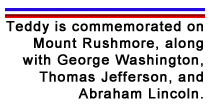Theodore 'Teddy'
Roosevelt (1858 - 1919) might
easily have enjoyed a life of
leisure, a wealthy Gilded Age New
Yorker observing from a distance
as urbanization and immigration
transformed the City; as
unchecked industry swallowed the
eager new Americans who produced
immense wealth for businessmen
and bankers; as the political
machine took advantage of a
government ill-prepared to meet
the needs of its working
class.
"There has never yet been a man in
our history who led a life of
ease whose name is worth
remembering."
Instead - and
despite many physical
limitations, including severe
asthma - he embraced the
"strenuous," as he called it, in
both his personal and
professional life. An avid
hunter, hiker and boxer,
Roosevelt thrived on pushing his
body to its limit and beyond.
When the Spanish-American War erupted in 1898, Roosevelt left
his position as Assistant
Secretary of the Navy to organize
and serve in the volunteer
cavalry known as the Rough
Riders. Under fire from
guerrillas, he led the successful
charge up San Juan Hill in Cuba,
later calling it the "great day"
of his life.
"Far better is it to dare mighty
things, to win glorious triumphs,
even though checkered by failure,
than to rank with those poor
spirits who neither enjoy nor
suffer much, because they live in
a gray twilight that knows not
victory nor defeat."
The zeal with which
he pushed his body was matched by
his fervor, as a member of the
Civil Service Commission and
later as New York City  Police
Commissioner, to root out
corruption, promote fairness and
eradicate cronyism and patronage.
Roosevelt believed each
individual deserved a fair
chance; with the playing field
leveled, each man is responsible
for his own success or
failure.
Police
Commissioner, to root out
corruption, promote fairness and
eradicate cronyism and patronage.
Roosevelt believed each
individual deserved a fair
chance; with the playing field
leveled, each man is responsible
for his own success or
failure.
As President,
Roosevelt saw his Republican
Party resist government
intervention into the burgeoning
new industries in the late 1800s,
while a growing social and
economic progressive reform
movement sought to protect
workers from unscrupulous bosses
and the American public from
corporate monopolies.
Roosevelt would
align with the progressives
throughout his presidential
terms. Remembered today as a
"trust-buster," his
administration worked to dissolve
over 40 violators of the Sherman
Anti-Trust Act. He further
alienated himself from the party
with his support for labor unions
and his call for social welfare
reforms.
 "Let the watchwords of all our
people be the old familiar
watchwords of honesty, decency,
fair-dealing, and commonsense ...
We must treat each man on his
worth and merits as a man. We
must see that each is given a
square deal, because he is
entitled to no more and should
receive no less."
"Let the watchwords of all our
people be the old familiar
watchwords of honesty, decency,
fair-dealing, and commonsense ...
We must treat each man on his
worth and merits as a man. We
must see that each is given a
square deal, because he is
entitled to no more and should
receive no less."
Roosevelt ended his
second presidential term
believing that his successor,
William Howard Taft, would
continue to advance the
progressive agenda. When this
didn't happen, Roosevelt
re-entered the political arena as
an opponent of Taft for the 1912
Republican Presidential
nomination.
"Our country offers the most
wonderful example of democratic
government on a
giant scale that
the world has ever seen; and the
peoples of the world are watching
to see whether we succeed or
fail."
The 1912 election
season was as combative as any before or after.
At that time only 12 states held
direct presidential primaries;
others had yet to embrace a
popular vote. Roosevelt won most
of the primaries - most by a
landslide - but in the other
states, the Party was in control,
and the Party wanted Taft. Taft
thought Roosevelt was a social
radical; Roosevelt thought Taft
was a reactionary career
politician; in the end, neither
man was awarded enough delegates
to claim victory, and the stage
was set for war at the Chicago
Coliseum that summer.
It was not lost on
Roosevelt or his supporters that
in the states where ordinary
citizens could vote, they were
voting most certainly for
Roosevelt. He began to contest
results in states where
conventions and caucuses chose
delegates, alleging a Taft bias.
A week before the convention, of
the 254 contested delegates, 235
of them were handed over to Taft
by the Republican National
Committee.
 Furious, certain that delegates had been stolen
from him, Roosevelt arrived in
Chicago and dramatically warned
that unless the delegates were
re-reapportioned fairly his
supporters would not participate
in the proceedings. When it
became clear that the Republican
Party would re-nominate Taft
despite his protestations,
Roosevelt and his delegates
walked out and later reassembled
as members of the newly formed
Progressive Party.
Furious, certain that delegates had been stolen
from him, Roosevelt arrived in
Chicago and dramatically warned
that unless the delegates were
re-reapportioned fairly his
supporters would not participate
in the proceedings. When it
became clear that the Republican
Party would re-nominate Taft
despite his protestations,
Roosevelt and his delegates
walked out and later reassembled
as members of the newly formed
Progressive Party.
"This country will not be a good
place for any of us to live in
unless we make it a good place
for all of us to live in."
Known unofficially
as the Bull Moose Party, owing to
Roosevelt's announcement that he
felt as "strong as a bull moose,"
the Party's platform called for
women's suffrage, environmental
conservation, child labor laws,
economic reforms, workers'
compensation and many other
progressive reforms.
Particularly with
regard to women's rights, the
Bull Moose Party represented a
major advance in the progressive
movement. In fact, neither
President Taft nor the Democratic
Party nominee that year, Woodrow
Wilson, would endorse women's
suffrage.
Roosevelt went
about the business of promoting
himself and his party with his
customary passion and intensity.
Hours before a scheduled speech
in Milwaukee that October, an
assailant fired a .32 caliber
pistol straight at Roosevelt's
heart; the bullet instead met the
case holding the folded-up speech
pages Roosevelt carried in his
breast pocket, only wounding him.
Still bleeding from the bullet
piercing, he gave the speech,
held up the now red-streaked
pages and announced, "It takes
more than that to kill a Bull
Moose!"
"A vote is like a rifle; its
usefulness depends on the
character of the user."
Unfortunately for
the Bull Moosers, with Roosevelt
and Taft now effectively
splitting the Republican vote,
the path was clear for the
Democrat Wilson to win the
election. Roosevelt did win more
votes than Taft, however - to this
day the only time a
third-party candidate beat one
of the two main parties.
 "There is not a man of us who does
not at times need a helping hand
to be stretched out to him,
"There is not a man of us who does
not at times need a helping hand
to be stretched out to him,
and
then shame upon him who will not
stretch out the helping hand to
his brother."
After the election,
Roosevelt and his son Kermit
embarked on a dangerous journey
in Brazil, traveling the
turbulent "River of Doubt." Their
crew of naturalists and cameramen
were plagued by insects,
injuries, hunger and fever but
managed to map the previously
uncharted river. Additionally,
thousands of bird and mammal
specimens were collected as they
navigated the perilous rapids,
later renamed Roosevelt River.
Roosevelt himself never fully
recovered from the malaria and
fever he contracted, which would
contribute to his early death at
the age of 60 in Oyster Bay, New
York.
"In any moment of decision, the
best thing you can do is the
right thing,
the next best thing
is the wrong thing,
and the worst
thing you can do is nothing."
Sources:
Bloomfield, Kevin. "The Progressive Party and the 1912 Presidential Election". President Elect, January 26, 2009
Historical Text Archive. Teddy Roosevelt and the Progressive Era, 1901-1908.
Howland, Harold (July 2001). "Theodore Roosevelt and His Times, a Chronicle of the Progressive Movement"; Project Gutenberg. Retrieved 2009-10-12
Law Library - American Law and Legal Information. Progressive Party.
Mowry, George E. The Era Of Theodore Roosevelt And The Birth Of Modern American 1900 1912. New York: Harper, 1958.
O’Toole, Patricia. "The War of 1912". Time, June 25, 2006.
Roosevelt, Theodore. Theodore Roosevelt: An Autobiography. New York: MacMillan, 1913.
Saunders, Roger. "Theodore Roosevelt's Rough Riders: A Band of Miners, Cowboys, Hunters Free Cuba in Spanish American War". Suite101, February 16, 2008.
Theodore Roosevelt Association. Chartered by an Act of Congress in 1920, The Theodore Roosevelt Association provides authoritative information on the life and ideals of Theodore Roosevelt.














